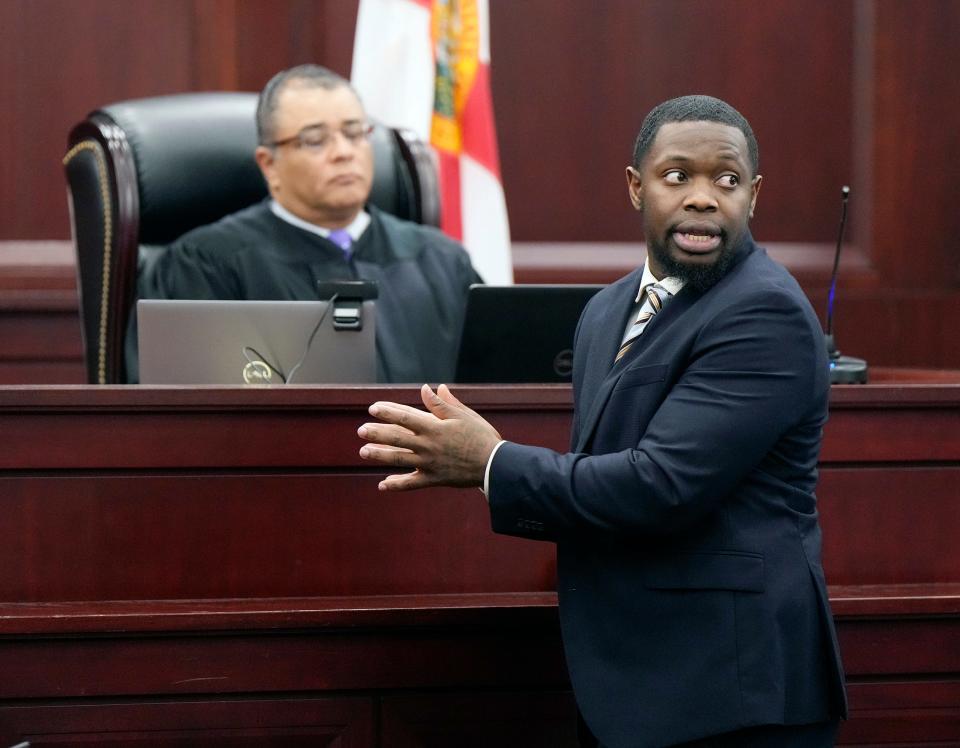Othal Wallace defense argues for less than 10.6 years prison in police officer's killing
- Oops!Something went wrong.Please try again later.
Othal Wallace, who was convicted of killing Daytona Beach police officer Jason Raynor, should receive lower than the 10.6 year minimum prison sentence set by state sentencing guidelines, according to a motion filed by his defense attorneys. Wallace faces a maximum of 30 years.
In a footnote, the motion cites the case of former Minneapolis police officer Derek Chauvin, who killed George Floyd in 2020 leading to widespread protests and a reexamining of police relations with the communities they serve. The motion states that Chauvin received less than 30 years in prison and that there were many examples of police officers receiving far less than the maximum sentence after being convicted of on-duty killings.
Wallace was found guilty by a Clay County jury on Sept. 16 of the lesser charge of manslaughter in Raynor's death. The jury, which included two Black jurors, deliberated for about 15 hours over two days before reaching a verdict.
Had Wallace been convicted of first-degree murder, prosecutors would have sought the death penalty.
The jury also bypassed a second-degree murder charge, which is punishable by up to life in prison. Manslaughter was the lowest charge Wallace faced.
Wallace, 31, shot Raynor on June 23, 2021. The 26-year-old remained hospitalized until his death on Aug. 17, 2021.
Wallace had been sitting in his car behind his girlfriend’s apartment in Daytona Beach when Raynor approached and asked him if he lived there. Wallace stood up and Raynor told him to sit down and placed a hand on Wallace’s shoulder. The incident quickly escalated and Wallace shot Raynor in the head.
Circuit Judge Raul Zambrano will sentence Wallace on Oct. 27 at the S. James Foxman Justice Center in Daytona Beach.

In a motion known as a “downward departure,” Wallace’s defense attorneys, Tim Pribisco and Terry Shoemaker, set out reasons why he should receive a sentence lower than the minimum.
Pribisco argued that the verdict indicates jurors rejected the prosecutors’ argument that Raynor lawfully detained Wallace.
Wallace subjected to 'abrupt interrogation' and 'undeserved physical contact'
“Accordingly, the evidence and the verdict support the argument that the manner and approach of Ofc. Raynor in initiating, and eventually escalating, this encounter should be a consideration during the imposition of the sentence,” the motion states.
The motion argues that Wallace was doing nothing wrong when Raynor questioned him.
It states, “Mr. Wallace, due to no fault of his own, was subjected to abrupt interrogation and undeserved physical contact which coalesced into a physical altercation.”
The motion continues: “Since Mr. Wallace did nothing to deserve inquiries into his residency, hands on his person, grasps to his clothing and a restriction of free movement in a place he had every right to be, Mr. Wallace is deserving of a sentence below the sentencing guidelines.”
The motion also argues that Wallace’s testimony that Raynor was reaching for his “gun belt” was supported by the “escalation of physicality” by Raynor and “his immediate placing of hands on” Wallace.
Wallace was prosecuted by 7th Circuit State Attorney R.J. Larizza and Assistant State Attorneys Jason Lewis and Andrew Urbanak. They presented evidence showing that Raynor did not take any of the steps necessary to draw his pistol, which was still secured in its holster when officers arrived to find him shot.
During the trial, prosecutors presented social media posts by Wallace in which he said he would one day be proud to get "pig’s blood on his hands and boots." When cross-examined by Lewis, Wallace denied he was referring to police officers and claimed he meant anyone who did not treat him as a human being.
The motion argues that the jury’s verdict rejected a malicious state of mind and the social media evidence had not been enough for a murder conviction.
Past cases involving police officers charged in killings
The motion also contains an exhibit listing some high-profile national cases of police officers who have been convicted of killings.
Chauvin, for example, was sentenced to 22 years for killing Floyd in 2020. Chauvin placed his knee on Floyd’s neck for nine minutes and Floyd’s killing sparked protests across the nation and beyond.
Former North Charleston officer Michael Slager pleaded guilty to killing Walter Scott, a Black man who ran from a traffic stop in South Carolina in 2015. Slager was sentenced to 20 years.
Former Fort Worth police officer Aaron Dean was found guilty of manslaughter for shooting and killing Atatiana Jefferson, a Black woman, through a window in 2019 in Texas. Dean was sentenced to 11 years.
Former Dallas police officer Amber Guyger, who shot and killed Botham Jean, a Black man, in 2018, was sentenced to 10 years in prison. Guyger lived one floor below Botham but said she entered Botham’s apartment believing it was her apartment.
Former Brooklyn Center police officer Kim Potter was convicted of manslaughter in the killing of Daunte Wright, a Black man, in Minnesota in 2021 and sentenced to two years. Potter said she mistakenly drew her gun when she meant to pull her Taser.
This article originally appeared on The Daytona Beach News-Journal: Daytona Beach convicted cop killer's defense argues for less prison time

